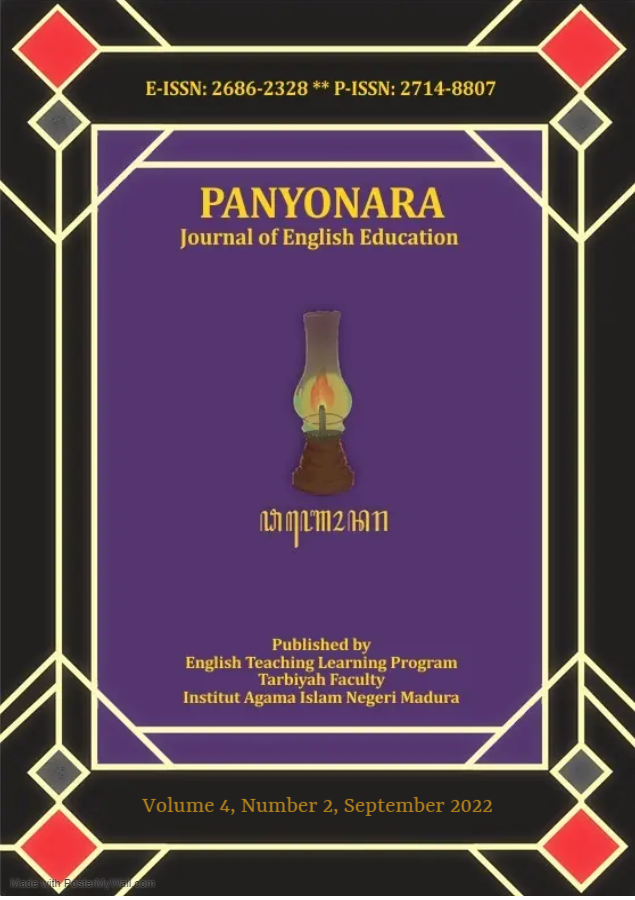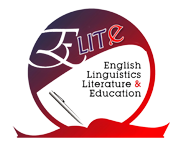An Analysis of Formative Assessment in Teaching English Used by Teacher
 Abstract views: 435
,
Abstract views: 435
,
 PDF downloads: 459
PDF downloads: 459
Abstract
The research is aimed at analyzing about the process of implementing classroom assessment and conducting formative assessment in English as Foreign Language (EFL) at Islamic Junior High School. The approach of this study used a qualitative research. One of the qualitative research designs applied in this study was case study design. The data were collected through interviews, observations, and documentation to an English teacher, as well as some observed students. Methodological triangulations were used to validate the data collected, which was then analyzed qualitatively and reported descriptively. The findings revealed that there are three points related to this research; the teacher has already understand about the concept of formative assessment, the teacher has already conducted the formative assessment in EFL classroom, and the challenges faced by teacher while conducting the formative assessment in EFL classroom . The challenges were the teacher' incapacity to design activities for the classroom and evaluation standards for including formative assessment, the enormous number of students in each class makes it impossible to provide quick feedback to them or incorporate comments into group activities, and given the constrained amount of class time, formative assessment is time-consuming and cannot be used. especially in light of a centralized educational system that prioritizes summative rather than formative assessment
Downloads
References
Ahmed, U., Akhtar, R.N. and Aslam, R. (2020) ‘Formative Assessment in Elementary English Classroom: a Case Study of Semi-Government Organization of Pakistan’, Academic Research International, 11(2), pp. 1–9. Available at: www.journals.savap.org.pk.
Ayu, I., Sri, M. and Saukah, A. (2020) ‘FORMATIVE ASSESSMENT IN EFL CLASSROOM PRACTICES’, Bahasa dan Seni Jurnal Bahasa Sastra Seni dan Pengajarannya, (September), pp. 1–15. doi:10.17977/um015v45i12017p050.
Bachman, L.F. (2004) Lyle F. Bachman - Statistical Analyses for Language Assessment (Cambridge Language Assessment)-Cambridge University Press (2004).pdf. Cambridge University Press.
Bennett, R.E. (2011) ‘Formative assessment: A critical review’, Assessment in Education: Principles, Policy and Practice, 18(1), pp. 5–25. doi:10.1080/0969594X.2010.513678.
Black, P. (2003) ‘The nature and value of formative assessment for learning’, Improving Schools, 6(3), pp. 7–22. doi:10.1177/136548020300600304.
Black, P. and Wiliam, D. (1998) Assessment in Education: Principles, Policy & Practice. doi:10.1080/0969595980050102.
Black, P. and Wiliam, D. (2009) ‘Developing the theory of formative assessment’, Educational Assessment, Evaluation and Accountability, 21(1), pp. 5–31. doi:10.1007/s11092-008-9068-5.
Boston, C. (2003) ‘The concept of formative assessment’, Practical Assessment, Research and Evaluation, 8(9), pp. 2002–2003. Available at: https://scholarworks.umass.edu/pare%0ARecommended.
Brown, H.D. (2004) Language assessment: principles and classroom practices. New York: New York: Pearson Education Inc. Available at: https://evelintampubolon.files.wordpress.com/2016/09/h-_douglas_brown_-_language_assessment.pdf.
Dunn, K.E. and Mulvenon, S.W. (2009) ‘A critical review of research on formative assessment: The limited scientific evidence of the impact of formative assessment in education’, Practical Assessment, Research and Evaluation, 14(7). doi:https://doi.org/10.7275/jg4h-rb87.
Good, R. (2011) ‘Formative Use of Assessment Information : It ’ s a Process , So Let ’ s Say What We Mean’, Practical Assessment, Research & Evaluation, 16(3), pp. 1–6.
Ketabi, Somaye and Ketabi, Saeed (2014) ‘Classroom and Formative Assessment in Second / Foreign Language Teaching and Learning’, ACADEMY PUBLISHER MANUFACTURED IN FINLAND, 4(February). doi:10.4304/tpls.4.2.435-440.
Klimenko, M.V. and Sleptsova, L.A. (2015) ‘Formative Assessment as a Component of the Future English Teacher Training’, Canadian Center of Science and Education, 8(8), pp. 1–9. doi:10.5539/ies.v8n8p157.
Lora, H.A., Rosidin, U. and Distrik, I.W. (2020) ‘The Analysis of Implementation of Assessment for Learning and Assessment’, 422(Icope 2019), pp. 179–182. Available at: http://creativecommons.org/licenses/by-nc/4.0/.
NINOMIYA, S. (2016) ‘The Possibilities and Limitations of Assessment for Learning: Exploring the Theory of Formative Assessment and the Notion of “Closing the Learning Gap&rdquo’;, Educational Studies in Japan, 10(0), pp. 79–91. doi:10.7571/esjkyoiku.10.79.
Putra, R.S. (2021) ‘English teachers’ perceptions and constraint on the use of authentic assessment in teaching English’, English Education Journal, 12(2), pp. 282–300. doi:10.24815/eej.v12i2.20457.
Rahman, K.A. et al. (2021) ‘Implementing a formative assessment model at the secondary schools: attitudes and challenges’, Language Testing in Asia, 11(1), pp. 1–18. doi:10.1186/s40468-021-00136-3.
Stiggins, R. (2005) ‘From formative assessment to assessment FOR learning: A path to success in standards-based schools’, Phi Delta Kappan, 87(4), pp. 324–328. doi:10.1177/003172170508700414.
Sukardi, M. (2008) Evaluasi Pendidikan. Jakarta: Bumi Aksara.
The journal uses an Open Access policy under a Creative Commons Attribution-NonCommercial 4.0 International License. Authors who publish with this journal agree to the following terms:
- Authors retain copyright and grant the journal right of first publication with the work simultaneously licensed under a Creative Commons Attribution License that allows others to share the work with an acknowledgment of the work's authorship and initial publication in this journal.
- Authors are able to enter into separate, additional contractual arrangements for the non-exclusive distribution of the journal's published version of the work (e.g., post it to an institutional repository or publish it in a book), with an acknowledgment of its initial publication in this journal.
- Authors are permitted and encouraged to post their work online (e.g., in institutional repositories or on their website) prior to and during the submission process, as it can lead to productive exchanges, as well as earlier and greater citation of published work.
















